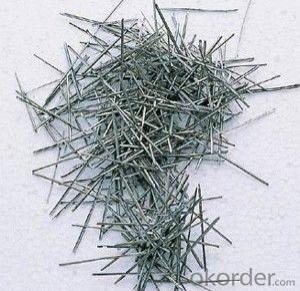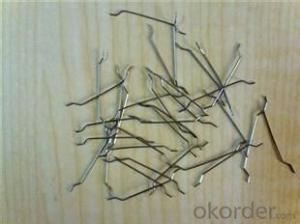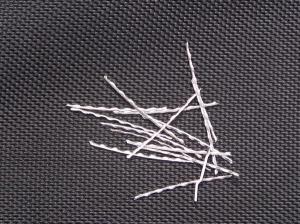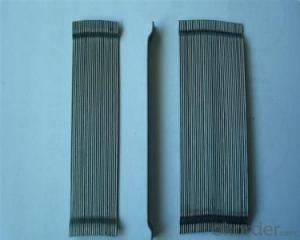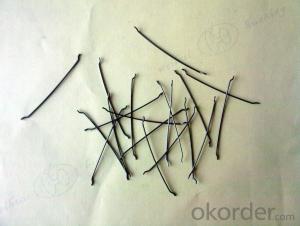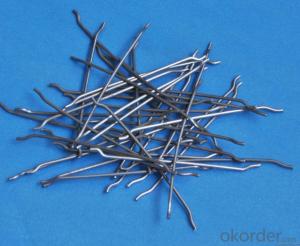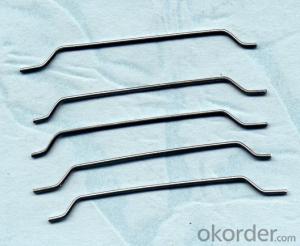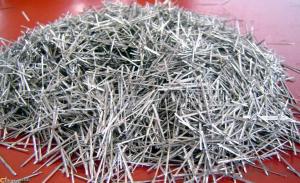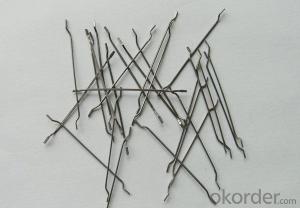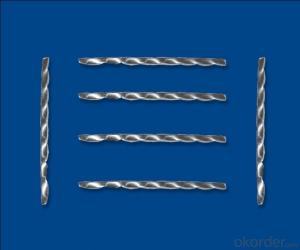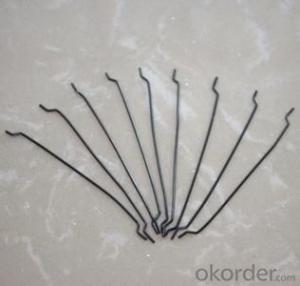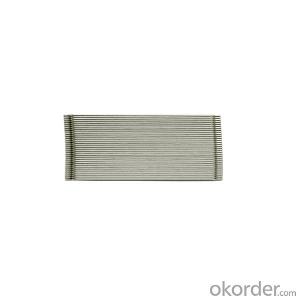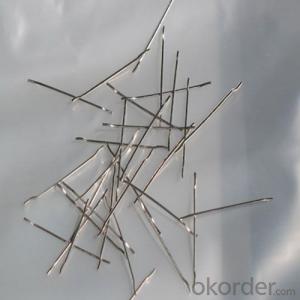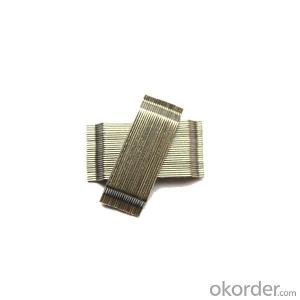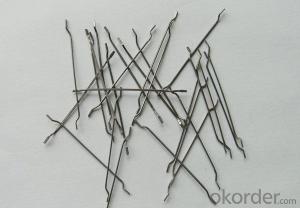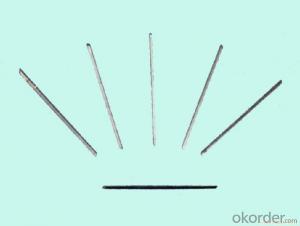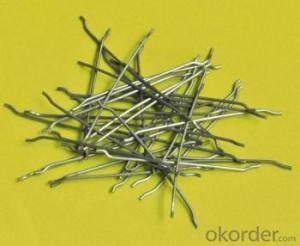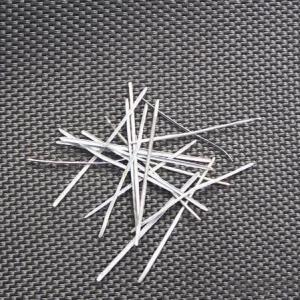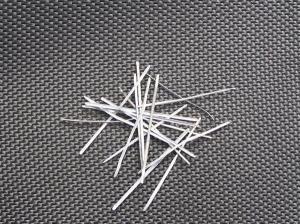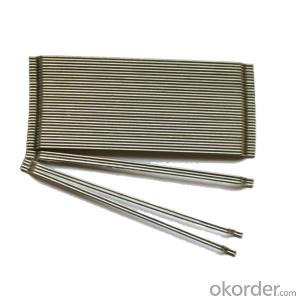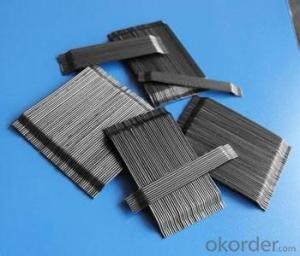Melt Extract Stainless Steel Fiber - China Supplier Concrete Steel Fiber from CNBM
- Loading Port:
- Tianjin
- Payment Terms:
- TT OR LC
- Min Order Qty:
- 1 m.t.
- Supply Capability:
- 600 m.t./month
OKorder Service Pledge
Quality Product, Order Online Tracking, Timely Delivery
OKorder Financial Service
Credit Rating, Credit Services, Credit Purchasing
You Might Also Like
Quick Details
Place of Origin: Tianjin, China (Mainland)
Model Number: 0.55
Material: Steel
Production Process: Cold drawn
Fiber Lengh: 35
Type: 1
Compressive Strength: >1200MPa
Aspect ratio: 63
Standard: ASTM A820M-11
Section Shape: Circular
Application: Concrete Reinforcement
Product Application: Industrial Floor
Packaging & Delivery
| Packaging Details: | 20 kg/Bag,50 bags/Pallet or 1,000kg/ Bulk Bag |
|---|---|
| Delivery Detail: | 1 Month |
Product Description
| Diameter | 0.55 mm (0.217 in) | ||
| Length | 35 mm (13.780 in) | ||
| Aspect Ratio | 63 | ||
| Tensile strength | 1200 MPa | ||
| Type | Cold drawn Steel Fiber | ||
| End | Hooked-end Steel Fiber | ||
| Glued/Loose | Glued Steel Fiber | ||
| Bending Angle | 45°(min.30°) | ||
| Usage & Performance | Floor:Trafficked areas and Industrial floors | ||
| Shotcrete :Slope stabilization and Final lining | |||
| Precast concrete:Pipe and Railway sleepers | |||
| Packing | Standard Export Pallet Packing | Bag Packing | 20 kg/Bag,50 bags/Pallet |
| Bulk Packing | 1,000kg/ Bulk Bag | ||
| Loading Quantity | 20’GP | 20-25 Tonne/Tonnes | |
| 40’GP | 25-27 Tonne/Tonnes | ||
| 40’HQ | 25-27 Tonne/Tonnes | ||
| MOQ | 1 kg for trial order | ||
| Supply Ability | 10,000 Tonne/Tonnes per Year | ||
| Payment Terms | T/T or L/C at sight | ||
| Delivery Time | Within 15 days after receiving deposit or original L/C at sight | ||
| Certification | ISO9001:2000, CE, | ||
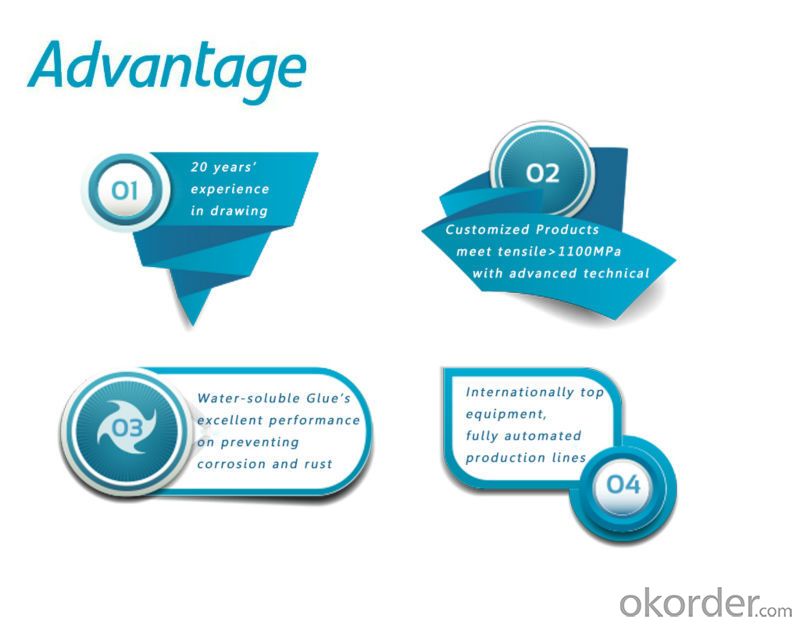
| Product | Diameter | Length mm/in | Aspect Ratio | Type | Packing |
| G-6030 | 0.5 mm (0.197 in) | 30 mm (11.811 in) | 60 | Glued | 20 kg/Bag, or 1,000kg/ Bulk Bag |
| G-6535 | 0.55 mm (0.217 in) | 35 mm (13.780 in) | 65 | Glued | 20 kg/Bag, or 1,000kg/ Bulk Bag |
| G-6035 | 0.6 mm (0.236 in) | 35 mm (13.780 in) | 60 | Glued | 20 kg/Bag, or 1,000kg/ Bulk Bag |
| G-8060 | 0.75 mm (0.295 in) | 60 mm (23.622 in) | 80 | Glued | 20 kg/Bag, 50 bags/Pallet |
| G-6060 | 0.9 mm (0.354 in) | 60 mm (23.622 in) | 60 | Glued | 20 kg/Bag, 50 bags/Pallet |
| G-6030 | 0.5 mm (0.197 in) | 30 mm (11.811 in) | 60 | Loose | 20 kg/Bag, or 1,000kg/ Bulk Bag |
| G-6535 | 0.55 mm (0.217 in) | 35 mm (13.780 in) | 65 | Loose | 20 kg/Bag, or 1,000kg/ Bulk Bag |
| G-6035 | 0.6 mm (0.236 in) | 35 mm (13.780 in) | 60 | Loose | 20 kg/Bag, or 1,000kg/ Bulk Bag |
| G-8060 | 0.75 mm (0.295 in) | 60 mm (23.622 in) | 80 | Loose | 20 kg/Bag, 50 bags/Pallet |
| G-6060 | 0.9 mm (0.354 in) | 60 mm (23.622 in) | 60 | Loose | 20 kg/Bag, 50 bags/Pallet |
- Q: Are there any limitations or drawbacks of using melt extract stainless steel fiber?
- Yes, there are limitations and drawbacks to using melt extract stainless steel fiber. One limitation is the high cost associated with this type of fiber. Melt extract stainless steel fibers are expensive compared to other types of fibers, making them less accessible for certain applications or projects with budget constraints. Another drawback is the potential for corrosion. While stainless steel fibers are generally resistant to corrosion, they are not completely immune. Depending on the specific environment and conditions they are exposed to, there is a possibility of corrosion occurring over time, which can compromise the durability and performance of the fiber. Moreover, melt extract stainless steel fibers can be challenging to handle and install. They are typically stiff and difficult to bend, making it more complex to incorporate them into certain applications or structures. This can lead to difficulties during the installation process and potentially impact the overall effectiveness of the fiber. Furthermore, the size and length of melt extract stainless steel fibers may also present limitations. They are usually available in shorter lengths compared to other types of fibers, which can restrict their use in certain applications that require longer fiber lengths. Lastly, the thermal conductivity of stainless steel fibers can be a drawback in certain situations. While their high thermal conductivity can be advantageous in some applications, it can also be a limitation in others. For instance, in projects where thermal insulation is a priority, the thermal conductivity of stainless steel fibers may not meet the desired requirements. In conclusion, while melt extract stainless steel fibers offer several benefits, such as high tensile strength and excellent resistance to high temperatures, they also have limitations and drawbacks that need to be considered before choosing them for a specific project or application.
- Q: Does melt extract stainless steel fiber affect the color or appearance of concrete?
- The color or appearance of concrete is not affected by melt extract stainless steel fiber. Typically, this fiber is included in concrete mixtures as a reinforcement material, rather than for aesthetic reasons. These fibers are typically small and thin, and when combined with the concrete, they seamlessly integrate with the other materials and do not change the color or appearance of the final product. The main purpose of melt extract stainless steel fibers is to enhance the concrete's strength and durability, making it more resistant to cracks and improving its overall performance.
- Q: Can melt extract stainless steel fiber be used in airport runway construction?
- Yes, melt extract stainless steel fiber can be used in airport runway construction. The addition of stainless steel fiber to the concrete mix enhances its durability, strength, and resistance to cracking. This is particularly beneficial in high-traffic areas like airport runways, as it helps to reduce maintenance requirements and extends the lifespan of the runway.
- Q: Can melt extract stainless steel fiber be used in parking garage construction?
- Certainly, melt extract stainless steel fiber is a viable option for incorporating into the construction of parking garages. Concrete reinforcement often includes stainless steel fibers, as they effectively enhance the structural integrity and durability of the material. These fibers contribute to improving the tensile and flexural strength of the concrete, while simultaneously minimizing cracking and shrinkage. Moreover, they heighten the concrete's ability to withstand corrosion and abrasion. Considering the typical conditions found in parking garages, such as heavy loads, vehicle traffic, moisture, and exposure to chemicals, the inclusion of stainless steel fibers can greatly enhance the longevity and performance of the concrete. Additionally, these fibers possess the added advantage of improving the fire resistance of the concrete, which is particularly crucial in parking garages where fire safety is of utmost importance. Ultimately, melt extract stainless steel fiber is an appropriate and efficient reinforcement material for the construction of parking garages.
- Q: Is melt extract stainless steel fiber compatible with different types of fiber-reinforced polymers?
- Yes, melt extract stainless steel fiber is compatible with different types of fiber-reinforced polymers.
- Q: How does melt extract stainless steel fiber improve the fire resistance of shotcrete?
- Melt extract stainless steel fiber improves the fire resistance of shotcrete by providing enhanced structural integrity and heat resistance. The fibers act as reinforcement, reducing cracking and spalling during high temperatures. This helps to maintain the structural stability of the shotcrete, preventing it from collapsing or disintegrating under fire conditions. Additionally, the stainless steel fibers create a barrier that slows down heat transfer, reducing the spread of fire within the shotcrete. Overall, the inclusion of melt extract stainless steel fiber significantly enhances the fire resistance of shotcrete, making it a more reliable and durable material for fire protection applications.
- Q: Can melt extract stainless steel fiber be used in combination with other types of reinforcement?
- Yes, melt extract stainless steel fiber can be used in combination with other types of reinforcement in various applications. It can be combined with materials like concrete, polymers, or composites to enhance their mechanical properties, such as improved tensile strength, crack resistance, and durability. The addition of stainless steel fibers can provide synergistic effects and improve the overall performance of the reinforced material.
- Q: Can melt extract stainless steel fiber be used in shot blast applications?
- Yes, melt extract stainless steel fiber can be used in shot blast applications. Shot blasting is a process that involves propelling abrasive materials at high speeds to clean, polish, or strengthen a surface. Stainless steel fibers are often added to shot blast applications to enhance the durability and effectiveness of the process. Melt extract stainless steel fibers are specifically designed to withstand the harsh conditions of shot blasting. They are made by melting stainless steel and then rapidly quenching it to create fine fibers with high tensile strength and excellent resistance to corrosion and heat. These properties make them well-suited for shot blast applications, as they can endure the abrasive impact and heat generated during the process. Using melt extract stainless steel fibers in shot blasting can provide several benefits. Firstly, they enhance the cleaning and polishing capabilities of the abrasive materials used in shot blasting, resulting in a more efficient and effective process. Additionally, the addition of stainless steel fibers can increase the durability and lifespan of the surface being blasted, as they reinforce and strengthen it. In conclusion, melt extract stainless steel fibers are indeed suitable for use in shot blast applications. Their high tensile strength, corrosion resistance, and ability to withstand heat make them an ideal choice for enhancing the performance and durability of shot blasting processes.
- Q: Is melt extract stainless steel fiber compatible with all types of concrete additives?
- Melt extract stainless steel fiber is generally compatible with most types of concrete additives. However, it is important to check the specific compatibility of the fiber with the additives being used in your concrete mixture. Some concrete additives, such as certain accelerators or superplasticizers, may have adverse reactions with stainless steel fibers. It is recommended to consult with the manufacturer or supplier of the stainless steel fiber and the concrete additives to ensure compatibility before using them together in your concrete mixture.
- Q: What are the advantages of melt extract stainless steel fiber over other types of steel fibers?
- Melt extract stainless steel fibers provide numerous benefits compared to other varieties of steel fibers. To begin with, the corrosion resistance of melt extract stainless steel fibers is exceptional. The fibers contain a significant amount of chromium, which produces a protective oxide layer on their surface. This layer acts as a barrier against corrosive elements, ensuring high resistance to rust and deterioration. This advantage is particularly crucial in environments where exposure to moisture, chemicals, or elevated temperatures is common. Furthermore, the mechanical properties of melt extract stainless steel fibers surpass those of other steel fibers. These fibers are manufactured by melting the steel and subsequently rapidly extracting it into fine filaments. This process results in fibers with a high tensile strength, enabling them to withstand heavy loads and resist deformation under stress. This strength also enhances the durability and lifespan of structures reinforced with melt extract stainless steel fibers. Moreover, melt extract stainless steel fibers possess a high melting point, rendering them suitable for use in high-temperature applications. These fibers can endure extreme heat without compromising their structural integrity, making them ideal for reinforcing concrete in settings such as industrial furnaces, fire-resistant structures, and thermal power plants. Additionally, the fine and uniform nature of melt extract stainless steel fibers allows for better dispersion throughout the concrete matrix. This leads to enhanced crack resistance and improved load-bearing capacity of the reinforced concrete. The small diameter of these fibers also facilitates superior bonding with the surrounding concrete, resulting in increased bond strength and overall structural performance. Finally, melt extract stainless steel fibers exhibit excellent electrical conductivity. This makes them appropriate for applications requiring electrical grounding or conductivity, like electromagnetic shielding or structures exposed to electrical currents. In conclusion, melt extract stainless steel fibers offer a multitude of advantages, including superior corrosion resistance, high mechanical strength, resistance to high temperatures, improved crack resistance, enhanced bond strength, and excellent electrical conductivity. These factors establish them as the preferred choice over other steel fibers for a wide range of applications in the construction, infrastructure, and industrial sectors.
Send your message to us
Melt Extract Stainless Steel Fiber - China Supplier Concrete Steel Fiber from CNBM
- Loading Port:
- Tianjin
- Payment Terms:
- TT OR LC
- Min Order Qty:
- 1 m.t.
- Supply Capability:
- 600 m.t./month
OKorder Service Pledge
Quality Product, Order Online Tracking, Timely Delivery
OKorder Financial Service
Credit Rating, Credit Services, Credit Purchasing
Similar products
Hot products
Hot Searches
Related keywords
